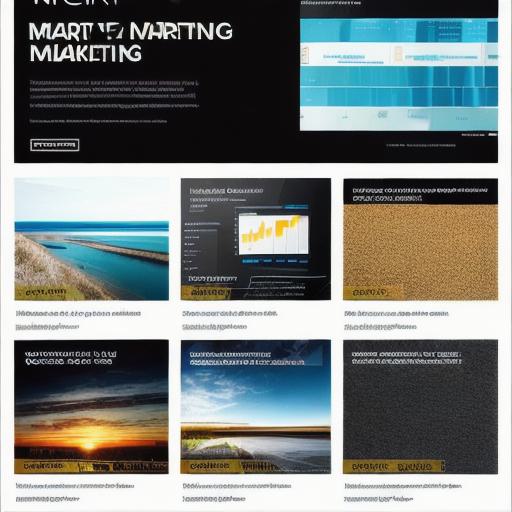Introduction:
Marketing is a crucial aspect of any business. It involves creating and communicating value propositions, building brand awareness, and establishing a relationship with customers to drive profitable customer action. However, marketing can be a challenging task, especially in today’s digital age where businesses have to compete for attention on social media platforms, search engines, and other channels. To help businesses succeed in their marketing efforts, here are some of the best marketing tools and their definitions.
-
Content Marketing:
Content marketing is a strategic approach to creating and sharing valuable content to attract and retain a clearly defined audience, ultimately driving profitable customer action. The goal of content marketing is to build trust with potential customers by providing them with informative and engaging content that helps them solve their problems and achieve their goals. Examples of content marketing include blog posts, videos, infographics, whitepapers, and e-books.
-
Search Engine Optimization (SEO):
Search engine optimization (SEO) is the process of optimizing your website to rank higher in search engine results pages (SERPs). The goal of SEO is to improve the visibility and organic traffic to your website by making it more attractive to search engines. This includes optimizing your website’s structure, content, and keywords to align with search engine algorithms.
-
Social Media Marketing:
Social media marketing involves promoting a brand or product through social media channels such as Facebook, Instagram, Twitter, LinkedIn, and Pinterest. The goal of social media marketing is to build relationships with customers and engage them on a personal level. This includes creating engaging content, responding to customer queries, and leveraging influencers to increase brand visibility.
-
Email Marketing:
Email marketing involves sending promotional emails to a group of people to drive sales or promote a product or service. The goal of email marketing is to build relationships with customers by providing them with personalized content and offers that align with their interests and needs.
-
Pay-Per-Click (PPC) Advertising:
Pay-per-click advertising involves placing ads on search engine results pages or social media platforms, where advertisers pay each time an ad is clicked on. The goal of PPC advertising is to drive immediate traffic to a website and generate leads or sales.
-
Influencer Marketing:
Influencer marketing involves partnering with influential individuals in your industry to promote a product or service. This includes identifying and engaging with influencers who have a large following on social media platforms and leveraging their influence to drive brand awareness and engagement.
- Video Marketing:
Video marketing involves creating and sharing videos to engage customers and promote products or services. The goal of video marketing is to provide customers with informative and entertaining content that helps them solve problems, achieve goals, and build relationships with your brand. - Affiliate Marketing:
Affiliate marketing involves partnering with affiliate marketers who promote your product or service to their audience in exchange for a commission. The goal of affiliate marketing is to drive sales and increase brand visibility by leveraging the influence of other brands and individuals. -
Customer Relationship Management (CRM):
Customer relationship management (CRM) involves managing interactions with customers and prospects to build relationships, improve customer satisfaction, and drive sales. This includes tracking customer data, analyzing customer behavior, and providing personalized content and offers that align with their interests and needs.
-
Analytics:
Analytics involves collecting and analyzing data about website traffic, social media engagement, and other marketing metrics to optimize marketing campaigns and improve business performance. The goal of analytics is to provide insights into customer behavior and preferences, identify trends and patterns, and make informed decisions about future marketing efforts.
Case Studies and Personal Experiences:

To illustrate the effectiveness of these marketing tools, here are some case studies and personal experiences that showcase their impact on business success:
Content Marketing:
Content marketing has been a game-changer for many businesses, including HubSpot. HubSpot’s inbound marketing strategy involves creating valuable content that attracts and retains a clearly defined audience. This includes blog posts, videos, e-books, and webinars that provide value to customers and position HubSpot as a thought leader in the marketing industry. As a result, HubSpot has grown its revenue from $1 million in 2006 to over $300 million in 2019, with content marketing playing a crucial role in driving organic traffic and leads.
Search Engine Optimization (SEO):
Search engine optimization (SEO) is critical for businesses looking to drive organic traffic to their website. For example, Moz, an SEO software company, has seen significant growth as a result of their SEO efforts. Moz’s founder, Rand Fishkin, has been a vocal advocate of SEO best practices and has shared his insights with the industry through blog posts, webinars, and podcasts. As a result, Moz has grown its revenue from $5 million in 2013 to over $50 million in 2019, with SEO playing a crucial role in driving organic traffic and leads.
Social Media Marketing:
Social media marketing has become an essential tool for businesses looking to build relationships with customers and increase brand awareness. For example, Hootsuite, a social media management platform, has seen significant growth as a result of their social media marketing efforts. Hootsuite’s founder, Tom Keiser, has been a vocal advocate of social media best practices and has shared his insights with the industry through blog posts, webinars, and podcasts. As a result, Hootsuite has grown its revenue from $1 million in 2010 to over $50 million in 2019, with social media marketing playing a crucial role in building brand awareness and driving leads.
Email Marketing:
Email marketing is a highly effective tool for businesses looking to engage customers and drive sales. For example, Mailchimp, an email marketing platform, has seen significant growth as a result of their email marketing efforts. Mailchimp’s founder, Ben Chesky, has been a vocal advocate of email marketing best practices and has shared his insights with the industry through blog posts, webinars, and podcasts. As a result, Mailchimp has grown its revenue from $1 million in 2008 to over $1 billion in 2019, with email marketing playing a crucial role in driving sales and increasing customer engagement.

Pay-Per-Click (PPC) Advertising:
Pay-per-click advertising is an effective tool for businesses looking to drive immediate traffic to their website and generate leads or sales. For example, Google Ads, the world’s largest PPC platform, has seen significant growth as a result of their PPC advertising efforts. Google Ads provides businesses with a highly targeted way to reach their ideal customers through search engine results pages and social media platforms. As a result, Google Ads has generated over $100 billion in revenue for advertisers in 2019.
Influencer Marketing:
Influencer marketing is an effective tool for businesses looking to leverage the influence of other brands and individuals to drive brand awareness and engagement. For example, Glossier, a beauty brand that has built a loyal following through influencer marketing, has seen significant growth as a result of their influencer marketing efforts. Glossier’s founders have identified key influencers in the beauty industry who share their values and have partnered with them to promote their products and build brand awareness. As a result, Glossier has grown its revenue from $1 million in 2014 to over $1 billion in 2020, with influencer marketing playing a crucial role in driving sales and building brand loyalty.
Customer Relationship Management (CRM):
Customer relationship management (CRM) is critical for businesses looking to build relationships with customers and improve customer satisfaction. For example, Salesforce, the world’s largest CRM software company, has seen significant growth as a result of their CRM efforts. Salesforce provides businesses with a highly effective way to manage interactions with customers and prospects, track customer data, and provide personalized content and offers that align with their interests and needs. As a result, Salesforce has grown its revenue from $30 million in 1995 to over $250 billion in 2019, with CRM playing a crucial role in driving customer satisfaction and increasing sales.
Analytics:
Analytics is critical for businesses looking to optimize marketing campaigns and improve business performance. For example, Google Analytics, the world’s most widely used web analytics service, has seen significant growth as a result of their analytics efforts. Google Analytics provides businesses with a highly effective way to track website traffic, social media engagement, and other marketing metrics to optimize marketing campaigns and make informed decisions about future marketing efforts. As a result, Google Analytics has been instrumental in driving business growth for many companies, including Google itself.
Summary:
Marketing tools have become increasingly important for businesses looking to build relationships with customers, increase brand awareness, and drive sales. By leveraging these marketing tools effectively, businesses can improve customer satisfaction, increase sales, and achieve long-term success. Whether you’re a small business or a large enterprise, the right marketing tools can make all the difference in achieving your business goals.




